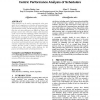Free Online Productivity Tools
i2Speak
i2Symbol
i2OCR
iTex2Img
iWeb2Print
iWeb2Shot
i2Type
iPdf2Split
iPdf2Merge
i2Bopomofo
i2Arabic
i2Style
i2Image
i2PDF
iLatex2Rtf
Sci2ools
115
click to vote
HPDC
2007
IEEE
2007
IEEE
Precise and realistic utility functions for user-centric performance analysis of schedulers
Utility functions can be used to represent the value users attach to job completion as a function of turnaround time. Most previous scheduling research used simple synthetic representations of utility, with the simplicity being due to the fact that real user preferences are difficult to obtain, and perhaps concern that arbitrarily complex utility functions could in turn make the scheduling problem intractable. In this work, we advocate a flexible representation of utility functions that can indeed be arbitrarily complex. We show that a genetic algorithm heuristic can improve global utility by analyzing these functions, and does so tractably. Since our previous work showed that users indeed have and can articulate complicated utility functions, the result here is relevant. We then provide a means to augment existing workload traces with realistic utility functions for the purpose of enabling realistic scheduling simulations. Categories and Subject Descriptors D.4.9 [Operating Systems]:...
Complex Utility Functions | Distributed And Parallel Computing | HPDC 2007 | Realistic Utility Functions | Utility Functions |
| Added | 02 Jun 2010 |
| Updated | 02 Jun 2010 |
| Type | Conference |
| Year | 2007 |
| Where | HPDC |
| Authors | Cynthia Bailey Lee, Allan Snavely |
Comments (0)

